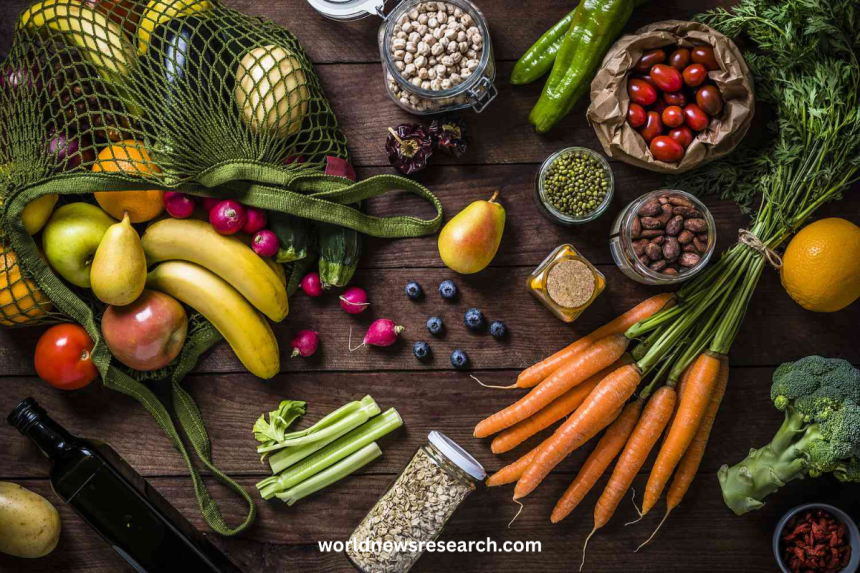In recent years, the term functional foods has garnered widespread attention for its potential to enhance health beyond basic nutrition. These foods, also known as nutraceuticals, are packed with bioactive compounds that offer a variety of health benefits, ranging from disease prevention to improving overall well-being. In this guide, we will explore what functional foods are, their benefits, the science behind them, and how they can be integrated into your daily life to boost your health.
What Are Functional Foods?
Functional foods are foods that provide health benefits beyond basic nutrition. Unlike traditional foods that only supply essential nutrients like proteins, fats, carbohydrates, vitamins, and minerals, functional foods contain additional ingredients or bioactive compounds that contribute to the prevention of diseases, enhancement of bodily functions, and promotion of optimal health.
The concept of functional foods began in Japan in the 1980s, when the government introduced a regulatory framework for approving foods that demonstrated scientifically supported health benefits. The idea was to help improve the nation’s overall health and prevent chronic diseases by promoting food consumption that contributed to better health outcomes.
While functional foods can include fortified and enriched foods, they can also be naturally occurring ingredients such as fruits, vegetables, grains, and dairy products that provide additional health benefits. Common examples of functional foods include:
- Fortified foods: Products that are enhanced with additional nutrients, such as vitamins, minerals, or fiber.
- Probiotics: Foods that contain beneficial bacteria, such as yogurt or fermented products, which support gut health.
- Foods rich in antioxidants: Fruits and vegetables that provide compounds known to combat oxidative stress and reduce the risk of chronic diseases.
- Foods with added fiber: Foods such as oats or whole grains that promote digestive health and lower cholesterol levels.
The Science Behind Functional Foods
Functional foods derive their health-promoting benefits from bioactive compounds, which are naturally occurring substances found in foods that have a positive effect on health. These compounds often work synergistically with other nutrients in the food to promote wellness and prevent disease. There are several categories of bioactive compounds that contribute to the functional properties of these foods.
Fiber
Dietary fiber is one of the most well-known and widely studied functional ingredients. It is crucial for maintaining digestive health, regulating blood sugar levels, and reducing the risk of heart disease. Fiber is found in whole grains, fruits, vegetables, and legumes. There are two types of fiber: soluble and insoluble. Soluble fiber, found in oats, apples, and beans, helps lower cholesterol and stabilize blood sugar. Insoluble fiber, found in foods like wheat bran and vegetables, aids in bowel regularity and digestion.
Probiotics
Probiotics are live microorganisms that confer health benefits when consumed in adequate amounts. These beneficial bacteria, found in foods like yogurt, kefir, and fermented vegetables, help maintain a healthy balance of gut microbiota. Probiotics have been shown to improve digestive health, boost immunity, and may even have a role in mental health by influencing the gut-brain axis.
Antioxidants
Antioxidants are compounds that help neutralize harmful molecules known as free radicals. Free radicals can cause oxidative stress in the body, which is linked to aging and the development of diseases such as cancer, heart disease, and neurodegenerative disorders. Common antioxidants include vitamins C and E, flavonoids, and polyphenols. Fruits like berries, citrus, and leafy greens are rich in antioxidants, helping to protect cells and tissues from damage.
Omega-3 Fatty Acids
Omega-3 fatty acids, which are found in fatty fish, flaxseeds, and walnuts, are essential fats that play a crucial role in reducing inflammation and supporting heart health. Omega-3s are also beneficial for brain function and may reduce the risk of mental health disorders like depression and anxiety. Regular consumption of omega-3-rich foods has been linked to a lower risk of cardiovascular disease, improved cognitive function, and reduced inflammation.
Phytonutrients
Phytonutrients, or plant-based nutrients, are bioactive compounds found in fruits, vegetables, nuts, and seeds. These compounds include carotenoids, flavonoids, and glucosinolates. Phytonutrients are known for their antioxidant, anti-inflammatory, and anticancer properties. For example, the carotenoids in carrots and sweet potatoes promote eye health, while the flavonoids in apples and berries support heart health.
Vitamins and Minerals
Vitamins and minerals are essential micronutrients that play vital roles in maintaining overall health. Functional foods may be fortified with additional vitamins and minerals to support specific health needs. For example, dairy products fortified with vitamin D promote bone health, while cereals enriched with folic acid support fetal development during pregnancy.
Benefits of Functional Foods
Functional foods offer a wide range of health benefits, many of which go beyond basic nutrition. These foods can help prevent chronic diseases, promote optimal growth and development, and improve overall health. Let’s explore some of the key benefits of functional foods.
Disease Prevention
One of the primary reasons people turn to functional foods is their potential to prevent chronic diseases. Foods rich in antioxidants, for instance, may help protect the body against oxidative stress, which is linked to conditions such as cancer, heart disease, and diabetes. Omega-3 fatty acids are known to reduce inflammation and lower the risk of heart disease. Probiotics contribute to gut health, which is increasingly recognized as a crucial factor in preventing autoimmune diseases, allergies, and digestive disorders.
Improved Heart Health
Functional foods that are rich in omega-3 fatty acids, fiber, and antioxidants can help improve heart health by lowering blood pressure, reducing cholesterol levels, and preventing the buildup of plaque in the arteries. For example, foods like fatty fish (salmon, mackerel), nuts (almonds, walnuts), and whole grains (oats, barley) are linked to a reduced risk of heart disease.
Gut Health
A healthy gut microbiome is essential for overall health, influencing digestion, immunity, and even mental well-being. Functional foods containing probiotics, prebiotics, and fiber help maintain the balance of beneficial bacteria in the gut. This can lead to improved digestion, reduced inflammation, and better immune function. Foods such as yogurt, kefir, sauerkraut, and kimchi provide a source of probiotics that support gut health.
Weight Management
Many functional foods are beneficial for weight management due to their ability to improve metabolism, increase satiety, and regulate appetite. For instance, high-fiber foods like whole grains, vegetables, and legumes can help you feel full for longer, reducing the tendency to overeat. Additionally, functional foods like green tea, which contains catechins, may boost metabolism and promote fat burning.
Cognitive Function
There is growing evidence that certain functional foods can support brain health and cognitive function. Omega-3 fatty acids found in fish, for example, are essential for brain structure and function. Foods rich in antioxidants, such as berries, may help protect the brain from age-related cognitive decline and reduce the risk of conditions like Alzheimer’s disease.
Bone Health
Functional foods fortified with vitamins and minerals like calcium and vitamin D play a crucial role in maintaining strong bones and preventing osteoporosis. Dairy products, fortified plant-based milk, leafy greens, and fish are excellent sources of these nutrients, helping to promote bone density and strength.
How to Incorporate Functional Foods into Your Diet
Incorporating functional foods into your daily diet is an effective way to boost your overall health and well-being. Here are some simple ways to add functional foods to your meals:
- Start your day with a nutrient-dense breakfast: Add oats to your morning routine for a healthy dose of fiber and beta-glucan, a type of soluble fiber. Top with berries for an antioxidant boost and a spoonful of chia seeds for omega-3 fatty acids.
- Snack on nuts and seeds: Almonds, walnuts, and flaxseeds are rich in healthy fats, fiber, and omega-3s. Keep a small handful on hand for a satisfying snack that supports heart health and satiety.
- Drink fermented beverages: Probiotic-rich drinks like kefir, kombucha, or fermented vegetable juices can support digestive health and boost immunity.
- Add leafy greens to your meals: Dark leafy greens such as spinach, kale, and Swiss chard are packed with vitamins, minerals, and phytonutrients that promote overall health. Use them in salads, smoothies, or as a side dish.
- Enjoy fatty fish: Incorporate salmon, mackerel, or sardines into your meals at least twice a week to benefit from omega-3 fatty acids that support brain and heart health.
Frequently Asked Question
What are functional foods?
Functional foods are foods that provide health benefits beyond basic nutrition. They contain bioactive compounds such as vitamins, minerals, fiber, and antioxidants, which contribute to disease prevention, improved bodily functions, and overall health.
How are functional foods different from regular foods?
While regular foods provide basic nutrients like protein, carbohydrates, and fats, functional foods offer additional health benefits. These foods may be naturally rich in bioactive compounds or fortified with extra nutrients like vitamins, minerals, or probiotics to promote better health.
Can functional foods prevent diseases?
Yes, many functional foods have been shown to help prevent certain chronic diseases. For example, foods rich in antioxidants may reduce the risk of cancer, heart disease, and other conditions by combating oxidative stress. Omega-3 fatty acids help reduce inflammation, and probiotics support gut health, which can prevent digestive issues and enhance immunity.
What are some examples of functional foods?
Common examples of functional foods include:
- Fortified foods: Cereal fortified with vitamins and minerals.
- Probiotic-rich foods: Yogurt, kefir, kimchi, and sauerkraut.
- Antioxidant-rich foods: Berries, citrus fruits, spinach, and other leafy greens.
- High-fiber foods: Oats, barley, whole grains, and legumes.
Are functional foods safe to consume?
Yes, functional foods are generally safe to consume, especially when they come from natural sources like fruits, vegetables, whole grains, and fermented foods. However, when consuming fortified foods or supplements, it is important to follow the recommended serving sizes to avoid overconsumption of certain nutrients, such as vitamins or minerals.
Can functional foods help with weight management?
Many functional foods can aid in weight management. High-fiber foods like whole grains, fruits, and vegetables can help you feel full longer, reducing the likelihood of overeating. Additionally, some foods like green tea and protein-rich foods can boost metabolism and promote fat burning.
What are the benefits of probiotics in functional foods?
Probiotics are beneficial bacteria that support digestive health and balance the gut microbiome. They can help improve digestion, enhance immunity, reduce symptoms of irritable bowel syndrome (IBS), and even contribute to better mental health by influencing the gut-brain axis.
How can I incorporate functional foods into my diet?
To add functional foods to your diet, consider the following:
- Start your day with fiber-rich oats and berries for breakfast.
- Snack on nuts, seeds, or probiotic-rich yogurt.
- Drink fermented beverages like kefir or kombucha for gut health.
- Add leafy greens like spinach or kale to your salads, smoothies, or as a side dish.
- Include fatty fish like salmon or mackerel in your meals for omega-3s.
Are functional foods only available in processed form?
No, functional foods can be both natural and processed. Many naturally occurring foods, such as fruits, vegetables, nuts, seeds, and whole grains, are considered functional foods due to their health benefits. Processed functional foods, such as fortified cereals or probiotic yogurts, are also available for those seeking additional health support.
Can functional foods replace medications?
Functional foods can support overall health and prevent disease, but they should not replace prescribed medications. It’s important to consult with a healthcare professional before making any significant dietary changes, especially if you have existing medical conditions or take medications.
Can functional foods improve mental health?
Some functional foods, such as those rich in omega-3 fatty acids, probiotics, and antioxidants, may have a positive effect on mental health. Omega-3s are linked to improved cognitive function, while probiotics may reduce anxiety and depression symptoms by supporting the gut-brain connection.
Conclusion
Functional foods offer a multitude of health benefits that go beyond the basics of nutrition. By incorporating nutrient-dense foods like fiber-rich grains, probiotic-rich dairy, antioxidant-packed fruits and vegetables, and omega-3-rich fish into your diet, you can improve your overall health, prevent chronic diseases, and enhance your quality of life.



